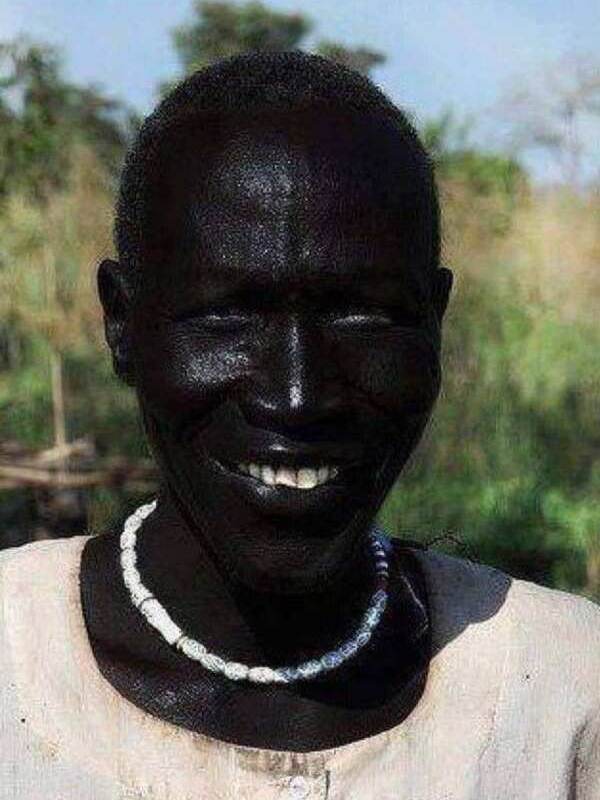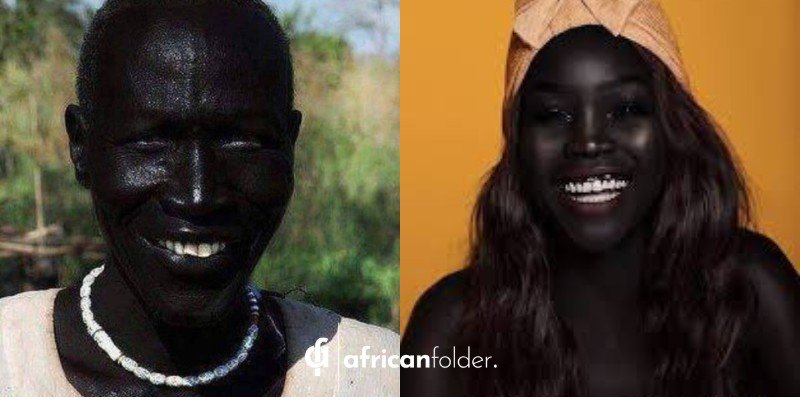Blackest Person In The World - Exploring Melanin And Identity
When people talk about the blackest person in the world, they're not just referring to skin tone but celebrating the beauty of melanin-rich individuals. The internet loves stories that challenge perceptions, and this is one of them. A few years ago, a photograph of an African man with incredibly dark skin went viral, sparking global conversations about race, identity, and the science of pigmentation.
But who exactly is this mysterious figure? And how does the story connect with other individuals like Nyakim Gatwech, a South Sudanese model often associated with the same title? This topic dives deep into the cultural significance of dark skin, historical contexts, and the role social media plays in amplifying these narratives. It's not just about melanin—it's about how society perceives and values it.
While there's no official Guinness World Record for the "blackest person," the fascination continues to grow. Through science, history, and personal stories, this article explores why this subject matters so much today. Let's start by looking at some of the people and stories behind the headlines.
Table of Contents:
- Who is the Blackest Person in the World?
- Biography - Nyakim Gatwech
- Why Does Melanin Matter?
- Can We Define the Blackest Person in the World?
- What About Felix Miner?
- Is Skin Tone Just a Descriptor?
- How Social Media Shapes Perceptions
- Why Celebrating Dark Skin Matters
Who is the Blackest Person in the World?
Let’s talk about the individual most often linked to this title. Nyakim Gatwech, a model from South Sudan, has been described as the blackest person in the world due to her strikingly dark skin tone. Her journey to global recognition isn’t just about aesthetics—it’s about redefining beauty standards. Gatwech’s presence on platforms like Instagram has inspired countless individuals to embrace their natural features.
But what about others who have been mentioned in this context? Felix Miner, from the Democratic Republic of the Congo, also gained attention for his exceptionally dark complexion. His skin reflects minimal light, leading some to recognize him as one of the darkest individuals alive. Yet, identifying the “blackest” person remains subjective. So, how do we navigate this conversation without reducing it to mere labels?
Biography - Nyakim Gatwech
Nyakim Gatwech is more than just a model; she’s a symbol of self-love and empowerment. Born in Ethiopia to South Sudanese parents, Gatwech grew up in a refugee camp before moving to the United States. Her life experiences shaped her into the confident woman she is today. Below is a quick overview of her personal details:
| Name | Nyakim Gatwech |
|---|---|
| Age | 27 years (as of 2023) |
| Origin | South Sudan |
| Residence | United States |
| Profession | Model, Activist |
In some respects, Gatwech’s rise to fame reflects broader societal shifts toward inclusivity. She’s not just celebrated for her looks but for her message of self-acceptance.
Why Does Melanin Matter?
Melanin is the pigment responsible for skin color, and its concentration varies widely among individuals. People with higher melanin levels tend to have darker skin tones, which can offer natural protection against harmful UV rays. However, melanin is more than just a biological trait—it carries cultural and historical significance.
For centuries, dark skin has been both celebrated and stigmatized. Understanding melanin means recognizing its role in human diversity and appreciating the beauty it brings to our world. It’s almost like each person’s skin tells a unique story, shaped by genetics and environment.
Can We Define the Blackest Person in the World?
Defining the "blackest person in the world" is tricky because it involves subjective interpretations. While some might point to individuals like Nyakim Gatwech or Felix Miner, the concept itself goes beyond skin tone. It’s about cultural identity, personal experiences, and the way society perceives dark skin.
Moreover, the absence of official records makes the discussion even more complex. The Guinness World Records doesn’t track skin tone, leaving the title open to interpretation. So, instead of focusing on definitions, why not celebrate the diversity that makes us all unique?
What About Felix Miner?
Felix Miner’s story adds another layer to this conversation. Hailing from the Democratic Republic of the Congo, Miner’s skin reflects only about 0.5% of the light that hits it. This incredible characteristic has earned him attention from scientists and admirers alike. But beyond the numbers, Miner’s story highlights the beauty of melanin-rich skin and the need to recognize its value.
Interestingly, Miner’s experience shows that being recognized for one’s skin tone isn’t always about fame—it’s about pride in one’s heritage. It’s kind of like saying, “This is who I am, and I’m proud of it.”
Is Skin Tone Just a Descriptor?
Describing someone by their skin tone can feel reductive if it overshadows their identity. Yet, for many, skin tone is an integral part of who they are. It’s not just a physical characteristic but a reflection of ancestry, culture, and personal history.
Sometimes, though, conversations about skin tone can lead to misunderstandings. People might focus too much on appearances instead of the deeper meanings behind them. That’s why it’s important to approach these discussions with sensitivity and understanding. After all, we’re talking about real people with real stories.
How Social Media Shapes Perceptions
Social media plays a huge role in shaping how we view beauty and identity. Platforms like Instagram and YouTube give voices to individuals who might otherwise go unheard. Nyakim Gatwech’s success, for example, wouldn’t be possible without the reach of social media.
Yet, social media can also amplify stereotypes and misconceptions. It’s kind of like a double-edged sword. While it allows for greater visibility, it also requires responsibility from both creators and audiences. We need to be mindful of the narratives we promote and the messages we send.
Why Celebrating Dark Skin Matters
Celebrating dark skin isn’t just about aesthetics—it’s about empowerment. For too long, dark-skinned individuals have faced discrimination and underrepresentation in various fields. By highlighting stories like Nyakim Gatwech’s, we challenge outdated beauty standards and promote inclusivity.
It’s really about fostering a world where everyone feels valued and respected, regardless of their appearance. This doesn’t mean ignoring differences—it means embracing them. After all, diversity is what makes life interesting, and celebrating dark skin is just one way to honor that diversity.
What Does the Future Hold for the Blackest Person in the World?
The future looks bright for those challenging traditional beauty norms. As more people embrace their unique qualities, the conversation around skin tone will continue to evolve. We’re already seeing shifts in media representation, advertising, and even scientific research.
Ultimately, the story of the blackest person in the world isn’t just about one individual—it’s about a movement. A movement toward acceptance, appreciation, and understanding. It’s about recognizing that beauty comes in all forms and celebrating the richness it brings to our lives.
So, as we wrap up this exploration, remember that the conversation about the blackest person in the world is more than just a curiosity. It’s a celebration of identity, resilience, and the power of self-expression. And that, in itself, is truly remarkable.

Top blackest Person In The World With Guinness World Record

Who Holds the Title of the Darkest Person in the World?

Who Is The Blackest Man In The World? | African Folder